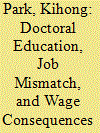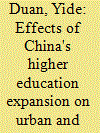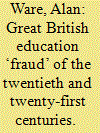| Srl | Item |
| 1 |
ID:
188933


|
|
|
|
|
| Summary/Abstract |
This study extends the previous literature on the wage effects of over-education, focusing on young doctorate holders (DHs). It also contributes to the conventional over-education literature on a causal relationship between over-education and wages by implementing techniques of propensity score matching (PSM). By tackling potential bias as a consequence of omitted variable bias via the PSM strategy, this study provides evidence of the negative influence of over-education on wages (i.e., the over-education wage penalty) once potential sources of bias are adequately considered. While the current analysis is focused on one country, South Korea, its results might be relevant for many other countries that have experienced a rapid expansion in the supply of DHs over recent years.
|
|
|
|
|
|
|
|
|
|
|
|
|
|
|
|
| 2 |
ID:
187851


|
|
|
|
|
| Summary/Abstract |
This study examines the heterogeneous effect of higher education on intergenerational mobility of rural and urban residents before and after China's higher education expansion (CHEE). Drawing on data from seven waves of the China General Social Survey (CGSS), we find that, although the overall effect of higher education decreases on alleviating intergenerational persistence after CHEE, undergraduate or postgraduate education can still significantly promote rural intergenerational mobility in terms of occupational-socioeconomic status. However, higher education appears to have changed from assisting social mobility to advancing intergenerational persistence in urban areas after CHEE. The propensity score matching method was used to mitigate sample selection bias, and all the findings were validated by several robustness checks, including placebo and Oster's (2019) omitted-variable tests.
|
|
|
|
|
|
|
|
|
|
|
|
|
|
|
|
| 3 |
ID:
141753


|
|
|
|
|
| Summary/Abstract |
The role played by educational credentials in British labour market recruitment changed radically during the mid-twentieth century. Having higher or better credentials than others became a key determinant in selection for society's best-paid jobs. The resulting race for them has had perverse effects. A large minority of graduates earn no more than non-graduates or are in jobs for which they are ‘overeducated’. In various ways, the incentive to ‘stay ahead’ has prompted large expenditures by families to improve the qualifications a child obtains at school, while there is also now huge demand for postgraduate qualifications. Not only is there resulting social waste but also social injustice; while education was understood previously as a means of breaking down barriers to social mobility, it now has the opposite effect. This article explores the causes of these developments and outlines briefly how a new centre-left agenda for education might be constructed.
|
|
|
|
|
|
|
|
|
|
|
|
|
|
|
|